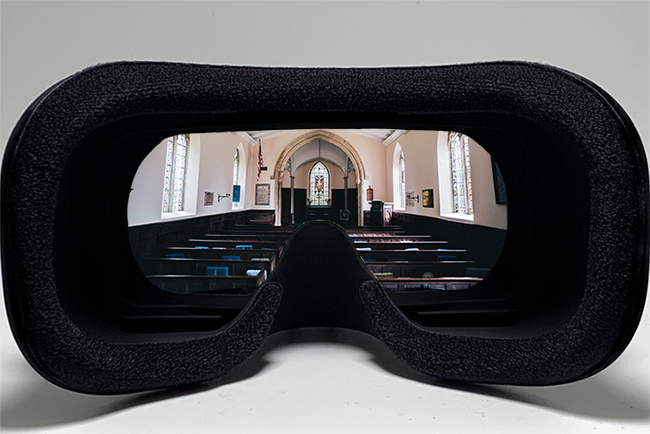
For many church leaders, the most promising aspect of the metaverse is its combination of digital and physical worlds, but that may also be the most troubling.
By Aaron Earls
In 1994, NBC’s Today Show hosts were trying to figure out the burgeoning but still fairly obscure internet. Katie Couric, Bryant Gumbel, and Elizabeth Vargas had an on-screen discussion about the @ symbol and the online world. As the confused hosts stumbled through explaining the whole concept, Couric asks an off-screen producer, “Allison, can you explain what ‘internet’ is?”
Of course, now we look back and laugh at their cluelessness about something that would fundamentally change society in a few years. The metaverse could be, as many are describing it, the next iteration of the internet. In a few decades, we may be immersed in the metaverse even more than we are currently surrounded by the internet. Or, the metaverse may be yet another high-profile technological advancement that flops and becomes all but forgotten.
In general, the metaverse is less a new technology and more of a new way to interact with technology. “Broadly speaking, the technologies companies refer to when they talk about ‘the metaverse’ can include virtual reality—characterized by persistent virtual worlds that continue to exist even when you’re not playing—as well as augmented reality that combines aspects of the digital and physical worlds,” according to a WIRED explainer article.
This combination of digital and physical worlds is what many see as the most promising aspect for churches. But it may also be the most troubling. For some, the metaverse is a new and important mission field in desperate need of churches to reach those who are already there and who will inevitably come. For others, the metaverse, if it ever even comes to fruition, is a distraction for churches, at best, or, at worst, a technological undermining of what it means to be the body of Christ.
Virtual congregation
In 2019, approximately 3,000 Protestant churches opened, but 4,500 closed, according to the latest findings from Lifeway Research. While those congregations were shutting their physical doors, others were opening digital ones. According to an August 2022 report on, ironically enough, the Today Show, churches hosting virtual reality services increased an estimated 500% in the previous six months. These virtual reality gatherings are what some consider to be the early stages of the metaverse.
Some congregations see the metaverse as the next step of, and an improvement over, livestreaming services. Prior to COVID-19, 41% of U.S. Protestant churches said they didn’t provide any option to watch services online. A month into the pandemic, however, only 8% said the same. As a result, almost half of American adults watched a church service online during the pandemic, including around 1 in 7 who normally don’t attend church.
Even as churches reopened at pre-pandemic levels earlier in 2022, more than 9 in 10 said they were still providing some type of online option. But 60% of pastors said they were encouraging those online viewers to attend in-person as soon as possible.
Proponents of creating church campuses in the metaverse say they can combine the ability of online streaming services to reach people who may never come into a physical church with many of the benefits of in-person congregations, like interpersonal conversations, involvement in community, worship service participation, and small group discipleship.
Jason Poling, lead pastor of Cornerstone Church of Yuba City, California, preaches two services on Sunday morning in a physical church sanctuary. On Sunday afternoons, he dons a VR headset and leads a service in the church’s metaverse campus. In the virtual auditorium, he preaches to the gathered assembly of a raccoon, a character from the TV show Breaking Bad, a green fox in a police vest, along with an assortment of other robots and anime creatures.

Virtual reach
These people “may not come to a brick-and-mortar church because it’s awkward for them,” Poling told the Today Show, but those individuals may be more likely to visit the digital church. “Alice from the U.K.” is now a member and weekly metaverse attender of Cornerstone. She said she would’ve been “very reluctant” to get involved in a church otherwise.
Thomas McFarin, a member of Cornerstone Church, was limited in his ability to physically attend services after suffering a heart attack. Now he helps lead the congregation’s virtual community, which he said means “everything” to him. “It gives me purpose,” McFarin said. “It’s an outlet I could’ve never even imagined before.”
Life.Church, the church behind the popular YouVersion Bible app, launched a metaverse campus in December 2021 with attendance growing steadily since then, according to Rachel Feuerborn, public relations manager at the church. Weekly attendance ranges from 60 to 120. Many of them aren’t attending anywhere else and “are at the very beginning of exploring their faith,” she said.
“@LifeChurch Metaverse is something we’re trying because we’re passionate about leveraging technology to reach people for Christ.” — @RachelNicole617 Click To Tweet“Life.Church Metaverse is something we’re trying because we’re passionate about leveraging technology to reach people for Christ,” Feuerborn said. “We know that to reach people no one is reaching, we have to do things no one is doing.” She said more than 45 people have decided to follow Christ at the metaverse campus.
Feuerborn said one man began watching their metaverse service this past Easter. When he found out Life.Church had a physical location in his city, he logged off and drove to attend in person. But the church isn’t pushing everyone to do so, she said. “Our heart is to reach people for Christ and inspire them to take whatever next step is right for them,” she said.
Virtual practice
“People all over the world think of Life.Church Online as their church home, and they join our global church community every week,” Feuerborn said. As part of that, the church continues to practice baptism and communion, but in unique ways. Feuerborn said the church works to facilitate an in-person baptism for anyone around the world. “We’ll connect them with a believer in their life, like a small group leader or close friend, who can baptize them, and then we’ll join in digitally to celebrate them going public with their faith,” she said. During communion, they encourage online and metaverse participants to prepare juice and a cracker or something similar themselves so they can eat and drink together as much as possible while scattered around the world.
“While some may find the metaverse unconventional, we believe it’s important to use every tool available today to carry out [the Great Commission].” — @RachelNicole617 of @LifeChurch Click To TweetFor Life.Church, Feuerborn said these efforts and forays into new technology are driven by the Great Commission. “Jesus Himself asks us to go into all the world and reach people with the gospel, and that’s what we’re striving to do,” she said. “While some may find the metaverse unconventional, we believe it’s important to use every tool available today to carry out that mission.” To that end, Life.Church wrote an article outlining the practices and resources they’ve used with their metaverse campus. “We love partnering with churches around the globe to reach more people for Christ,” Feuerborn said.
Digital disconnect
Others, however, see the metaverse as a current distraction or even a potential hazard to making disciples who truly understand what it means to live as Christians in God’s created world.
“Don’t be afraid of the metaverse, but don’t invest much into it beyond the time it takes to get a basic education about it,” said Chris Martin, author of Terms of Service, a book on Christians and the social internet. “You can’t adopt the metaverse yet because it doesn’t really exist. There are shadows of it, but there isn’t really anything to do yet.” He contends virtual reality is not actually the metaverse.
But current VR gatherings and whatever church in the future metaverse would look like have unintended consequences, said technology and culture writer L.M. Sacasas. He worries any potential positives of launching a metaverse version of church would be overwhelmed by the negatives. “I understand the desire to get the message out, but it’s not clear to me at this point what being in the metaverse would even entail in practice or that there’s a sub-group of people who could only be reached through the metaverse,” he said. “This does not, in my view, outweigh the need for the church to recover an appreciation of the goodness of the body and creation.”
The potential good of reaching people through the metaverse doesn't "outweigh the need for the church to recover an appreciation of the goodness of the body and creation,” says @LMSacasas. Click To TweetSacasas contends evangelical Protestants tend to uncritically embrace new technologies as merely tools to spread their message without considering how those technological tools can reshape those using them and those reached by them. As they consider adopting any technology, including the metaverse, he said church leaders should “seriously question whether the new technology in fact advances their aims, whether that be discipleship, moral formation, or witness.”
The embodied church
Humans are embodied creatures, said Sacasas, and this is not a flaw but part of the goodness of God’s created world. “Our embodied condition implies a series of limits, which we do well to abide by rather than to transgress,” he said. “We are limited in place and time, in scope of the communities to which we can meaningfully belong.” The church needs to recover an understanding of the fundamental goodness of the embodied condition, Sacasas said, and the metaverse envisions a world that only further erodes this concept.
He doesn’t see a church adding a version of themselves on the metaverse as comparable to planting a new campus, but rather somewhere between adding a website and abandoning the fundamentals of being a church. This is especially true, he said, if “a metaverse presence displaces the full embodied gathering of God’s people.”
For the pastors worried they’ll be left behind the next technological wave, Martin said the metaverse only matters as it’s the assumed next iteration of the internet. Pastors can be curious, but they shouldn’t be consumed with it. “Don’t even think about planning for the metaverse if you haven’t figured out social media,” he said. “Likewise, consider the reality that digital experiences, even the most sophisticated virtual reality experiences, don’t compete with in-person experiences for building and maintaining community.”
"Digital experiences, even the most sophisticated virtual reality experiences, don’t compete with in-person experiences for building and maintaining community.” — @ChrisMartin17 Click To TweetPastors should be less concerned about what’s coming down the technology pike and paying more attention to the technology already impacting their congregations, according to Sacasas. “The pastor of a church, with so much on their plate already, should worry less about the metaverse and more about how everyday technologies are already shaping the moral and spiritual lives of their parishioners.”
What should a pastor do right now? “Love your people. Don’t pay attention to the hype,” said Martin.








